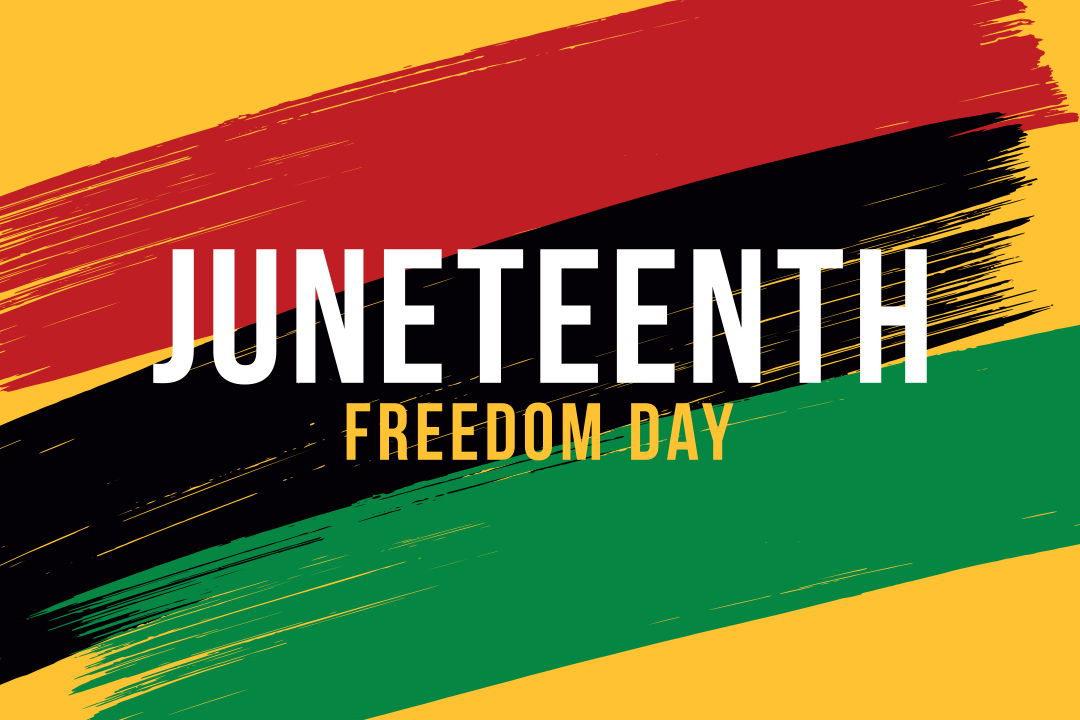This week, GW Law recognizes Juneteenth, the oldest nationally celebrated commemoration of the end of chattel slavery in America.
Also called Freedom Day, Juneteenth commemorates June 19, 1865, the day Union soldiers arrived in Galveston, Texas, and enforced President Abraham Lincoln’s Emancipation Proclamation, informing enslaved African Americans that they were free. For many of the enslaved in Texas, Juneteenth was the first time they had heard that they were free, over two years after President Lincoln declared the Emancipation Proclamation. The holiday has been celebrated by Black Americans ever since. It became an official federal holiday in 2021.
To honor Juneteenth this year, GW Law Dean Dayna Bowen Matthew reflects on the history of the holiday and its importance to American democracy and society at large:
What Juneteenth Means To Me
As an African American, I am accustomed to Juneteenth celebrations that focus exclusively on the music, poetry, financial, and political contributions of the Black American community to America. This year will be different for me. I will reflect on what Juneteenth celebrations mean to our democracy.
I am struck by Juneteenth not as the end of the Civil War and slavery era, but as the mark of the beginning of the 12-year period known as the Reconstruction Era. Reconstruction represents one of the most successful periods of interracial democracy—a fulfillment of the democratic experiment that is this nation's foundation.
For the first time, our democracy encompassed equality of participation and representation. According to History.com, 16 African Americans served in U.S. Congress during Reconstruction, and more than 600 were elected to state legislatures.
This influx of new African American leadership was bolstered by three constitutional amendments that expanded the rights of African Americans, paving the way for a more equal society.
The first of these amendments, the 13th Amendment, ended chattel slavery, except as criminal punishment. The 14th Amendment ensured the rights to due process and equal protection, formally providing citizenship to “any person born or naturalized in the United States,” including formerly enslaved people. And the 15th Amendment granted the right to vote to Black men, and, later, Black women.
Still, economic recovery after the war was not immediate. The transition from a slave-labor based economy to a free-labor economy turned violent in the South. In the North, corrupt forces plagued the exercise of political power. Our government increased new tariff laws that protected northern industry from European competition. Congress passed laws such as The Homestead Act to incentivize small western farms and a National Banking System to accelerate regional trade. And still, all these Constitutional and legislative advances could not recover our nation after its bloody Civil War.
Juneteenth this year will allow me to reflect on the vital, indispensable, and powerfully important role that higher education played in the economic reconstruction of a devastated economy. In 1862, President Lincoln signed the first Morrill Land Grant, establishing colleges that would focus on agriculture and the mechanical arts. The land grant promoted a more practical and liberal education for the industrial classes, and the federal government provided 30,000 acres of federal land to each state, allowing them to sell or develop the land to fund these new institutions. Thanks to the first Morrill Land Grant, numerous land-grant universities opened across the nation, expanding access to higher education. In 1890, Congress enacted the second Morrill Act, which ensured educational opportunities for African Americans at land-grant colleges, requiring states to either demonstrate that race was not a factor in admissions or to establish separate land-grant institutions for Black students.
This legislation allowed for the establishment of great land grant universities and colleges, many HBCUs such as Universities of Wisconsin, Missouri, Iowa, Rutgers, HBCUs that have been the engine of workforce development for over 150 years. The expansion of higher education thus fueled our readiness to compete globally, equipping a workforce for the Gilded Age, the industrial revolution, and our emergence from The Great Depression.
This history is especially important to me as the Dean of GW Law. Our Law was founded in 1865. The end of the Civil War meant that lawyers would be needed to help bring a divided country together. This is our legacy.
And so for me, Juneteenth commemorates the importance of higher education generally, and this great law school specifically, at a time when our nation and the world face an inflection point.
This year, I will celebrate Juneteenth as a time for our law school to again help our nation to grow ever closer to our democratic ideals, and give meaning to the preamble of our Constitution:
“We the People of the United States, in Order to form a more perfect Union, establish Justice, insure domestic Tranquility, provide for the common defence, promote the general Welfare, and secure the Blessings of Liberty to ourselves and our Posterity, do ordain and establish this Constitution for the United States of America.”
This is what Juneteenth means to me this year.


